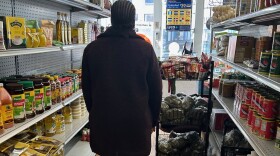Singer, actor and human rights activist Harry Belafonte died this week at the age of 96. Belafonte broke racial barriers in the 1950s through his music and challenged Americans to rethink their assumptions about the world.
Among the recordings he was best known for was "Day-O (The Banana Boat Song)."
Connecticut Public Radio’s Diane Orson, who is also a professional musician, toured with Belafonte as a backup singer. She shared her experience.
Lori Mack: Set the scene, Diane, when and for how long were you on the road with Harry Belafonte?
Diane Orson: It was the year 1979. I was on tour with him for an eight-month stint. We traveled through Japan, throughout the U.S. and through Europe. I also worked with him a bit the year after that for a couple of concerts. But it was an extraordinary opportunity for me. It came out of the blue really. And I had the time of my life.
Mack: What was he like?
Orson: I learned so much from Harry Belafonte. First of all, he was a tremendous leader in every way musically, and in terms of the way he ran his company. He had the final say in everything.
He was always gracious, he held all of us to very high standards. Every single night, he gave employees of Belafonte Enterprises Incorporated, which is what I was working for, opportunities to correct problems musically. But if people didn't meet his standards, they were fired. He was tough. But he was also unusual as an artist, he had very strong ideas and a vision for his show.

He was also quite aware of his musical strengths and his limitations. And what he did, which was so brilliant, was to surround himself with the right people, people who made him look really good and who he really listened to, and he was just amazing to watch. He loved being a star. He loved interacting with his audiences, he knew that his position was one which was quite influential and he took that responsibility very seriously.
As a performer, watching him every night, he knew how to get the audience in the palm of his hands and keep them there. And he was able to do that across cultural differences, you know, different types of audiences in Japan versus let's say, audiences in Europe. He just loved performing and it was quite a privilege to work with him.
Mack: In the introduction, I mentioned that Belafonte broke racial barriers, he was a real human rights activist, can you talk a little bit about that side of him?
Orson: The best way for me to answer that, in terms of my personal experience working with him, was through the music and the selections he made. Every song was conceived of as a means of communicating something. And I would say musically, he did a huge amount to open the world to music of the Caribbean and to respect that music.
He was a musician, but music was also a vehicle for him to send a message to the world about peoples who were underrepresented. His peak was really in the late 50s, and 60s, and that was a period in which not a lot of this music was being played in its authentic folk versions. He took work songs, he took labor songs of the people, and brought them to so many audiences globally that would never have been exposed at that time. And so, there's so much to say about Harry Belafonte. But I think from my personal experience, musically, music was a vehicle to reach out to the world.

Mack: You mentioned that you learned a lot from him. Talk a little more about that.
Orson: Because he was such a multi-dimensional individual, I learned a lot of different things from him. He used his platform as a star to make important strides for those whose voices were not being heard at that time. And he took that very seriously. He was also super smart about the way he did that, and he had grace and dignity, but he was not a pushover at all. And knew where to draw the line. I really respected to that.
Mack: Diane, is there anything else you want to mention about Harry Belafonte?
Orson: Yeah, there's one more thing I want to mention. I had this wonderful opportunity when I was in my early 20s, and I was the youngest in the company by quite a number of years. There were only four women traveling with the group. We were a group of 26. It was a by far majority Black company and it was a fantastic experience for me to be in that position, to experience living and working and basically being in a family that was quite different from the world I had grown up in. And I witnessed things from a perspective I'd never seen before, and it left a lasting imprint on my life.





